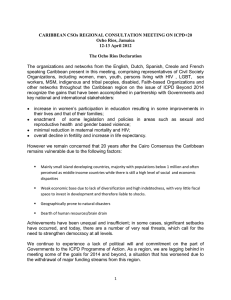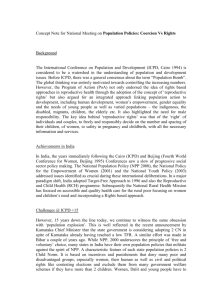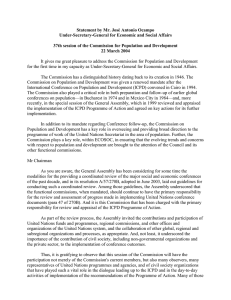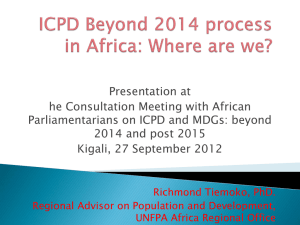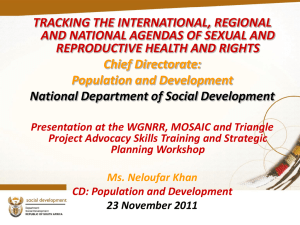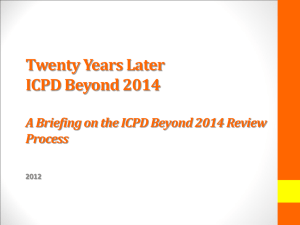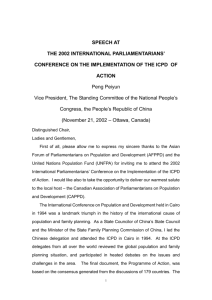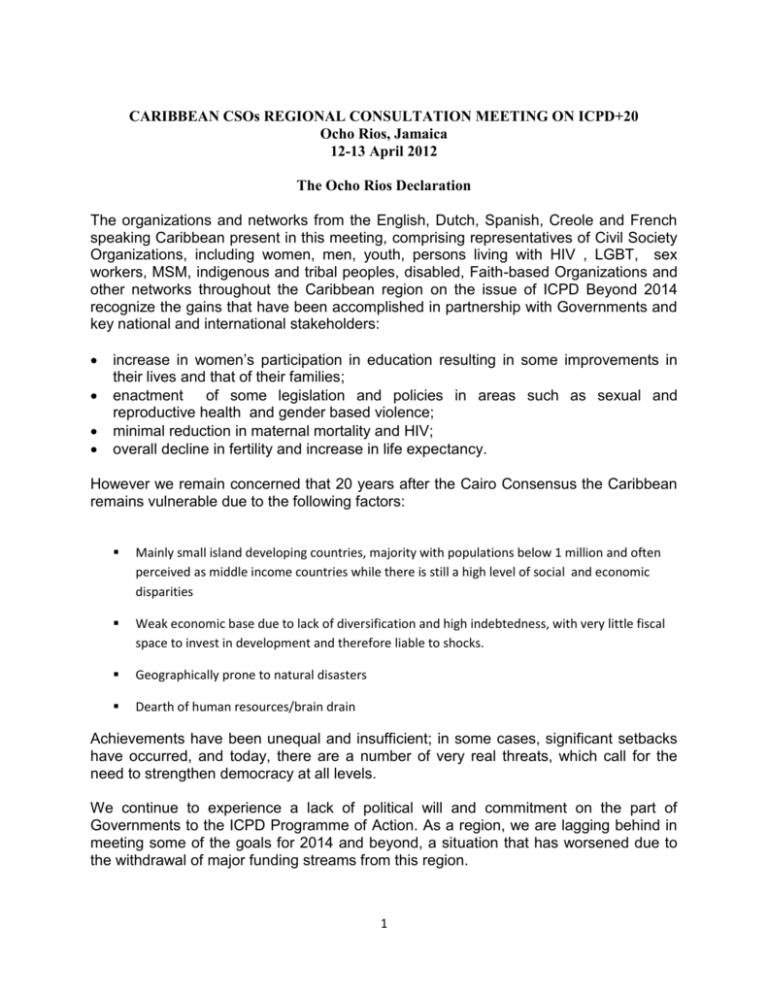
CARIBBEAN CSOs REGIONAL CONSULTATION MEETING ON ICPD+20
Ocho Rios, Jamaica
12-13 April 2012
The Ocho Rios Declaration
The organizations and networks from the English, Dutch, Spanish, Creole and French
speaking Caribbean present in this meeting, comprising representatives of Civil Society
Organizations, including women, men, youth, persons living with HIV , LGBT, sex
workers, MSM, indigenous and tribal peoples, disabled, Faith-based Organizations and
other networks throughout the Caribbean region on the issue of ICPD Beyond 2014
recognize the gains that have been accomplished in partnership with Governments and
key national and international stakeholders:
increase in women’s participation in education resulting in some improvements in
their lives and that of their families;
enactment
of some legislation and policies in areas such as sexual and
reproductive health and gender based violence;
minimal reduction in maternal mortality and HIV;
overall decline in fertility and increase in life expectancy.
However we remain concerned that 20 years after the Cairo Consensus the Caribbean
remains vulnerable due to the following factors:
Mainly small island developing countries, majority with populations below 1 million and often
perceived as middle income countries while there is still a high level of social and economic
disparities
Weak economic base due to lack of diversification and high indebtedness, with very little fiscal
space to invest in development and therefore liable to shocks.
Geographically prone to natural disasters
Dearth of human resources/brain drain
Achievements have been unequal and insufficient; in some cases, significant setbacks
have occurred, and today, there are a number of very real threats, which call for the
need to strengthen democracy at all levels.
We continue to experience a lack of political will and commitment on the part of
Governments to the ICPD Programme of Action. As a region, we are lagging behind in
meeting some of the goals for 2014 and beyond, a situation that has worsened due to
the withdrawal of major funding streams from this region.
1
These commitments remain relevant and critical to the livelihoods of the Caribbean
people. The failure to fulfill these promises would mean the violation of fundamental
human rights such as political, economic, social, cultural, sexual and reproductive
health and rights, and the right to education, to work, to a life free from violence and the
right to development for millions of men, women and young people, of all ages,
ethnicities, identities, sexual orientation throughout the Caribbean Region. Erosion of
these human rights could result in prohibitive costs and condemn the Caribbean people
to situations of exclusion, violence and discrimination.
Civil Society Organizations and regional networks have contributed tremendously and
have actively participated in strengthening government’s accountability towards meeting
their commitments.
The strengthened engagement and the inclusion of voices of indigenous and tribal
peoples, disabled people, youth led, faith based, LGBT (Lesbian, Gay, Bi-sexual and
Trans) and Men’s organizations in this process has enriched the dialogue and has
redefined the challenges of meeting the Cairo agenda.
In this context, we call on all of our governments of the Caribbean to recognize,
implement and reinforce the commitments to which they agreed and accepted in 1994
and 1999 and reaffirmed in 2004 and 2009, particularly the promise to promote and
achieve sustainable development through:
Ensuring full participation of women in all aspects of development
Developing capacity to collect, analyse and translate data into strategic information to feed
policy formulation
Disaggregating, disseminating of data to inform programme development and implementation
at all levels.
Recognition and protection of sexual and reproductive health and rights
Development and implementation of comprehensive sexuality education for youth in and out of
school
Strengthening of safe motherhood initiatives including access to safe abortions
Elimination of gender based violence
Legal recognition and protection of rights of indigenous and tribal peoples and all minority
groups such as youth at risk, LGBT, elderly, disabled, mentally ill, most at risk populations (sex
workers, men who have sex with men and drug users)
2
Strengthening and enforcement of an inter-disciplinary approach to gender mainstreaming into
all national policies.
Development of policies and programmes for the prevention of teen pregnancy and re-entry of
teen mothers into formal education.
Development of support systems for underemployed parents including teens.
Removal of sanctions/revision of legislation, policies and practices that would prevent the
provision of SRH services to under 18 individuals.
Ensuring universal access to youth friendly SRH services.
Promoting the responsibility between men and women, in care-taking through a system of
protection and social welfare, with basis in equal parity, recognizing women’s unremunerated
domestic work (Quito Consensus, 2007)
Strengthening and expansion of social protection policies and systems based on principles of
shared responsibilities.
We call on UNFPA and Development partners to:
Ensure the capacity enhancement of CSOs to effectively engage with governments and
participate in the ICPD Beyond 2014 processes at national, regional and global levels.
Provide technical assistance for the establishment and maintenance of a regional CSO
Coalition to provide oversight and monitoring and evaluation of ICPD +20 and Beyond
Build the capacity of the members of the regional CSO coalition to advocate for
Governments to honour their commitments
Assist in mobilizing resources to facilitate the above
Assist in strengthening the cooperation between national civil society organizations to
leverage resources and maximize impact.
Strengthening the coordination and harmonization of inter-agency and intergovernmental
responses at the national and regional levels.
Civil Society Organizations commit to:
Maintaining and strengthening partnerships with Governments to facilitate ongoing
dialogue and joint decision making with respect to monitoring and implementation of the
ICPD POA and its reviews.
3
Creating conditions that will guarantee transparency and accountability for all budgetary
allocations related to ICPD
Continuing to maintain and further the advancements made under the ICPD global
arrangements
Strengthen advocacy for the implementation of policy and legislation
As a matter of priority we recommend the following:
Ratify, implement and enforce all human rights instruments that are linked to the ICPD POA.
Ensure the economic, political and social empowerment of women and their full
participation in decision making at all levels.
Provide a comprehensive package of sexual and reproductive health services that includes
family planning; access to the widest possible range of contraceptives, including emergency
contraception; comprehensive sexuality education; a continuum of pre-natal and post-natal
care, delivery assistance by skilled health workers and emergency obstetric care;
prevention. Diagnosis and treatment of STIs, including HIV and access to safe abortion and
post abortion care.
Support the development and strengthening of social protection mechanisms, legislation
and policy aimed at reducing the vulnerability and risks related to social and economic
inequalities.
Preserve the rights of indigenous and tribal peoples, migrant populations, persons with
disabilities and other vulnerable groups.
Take full measures to eliminate all forms of exploitation, abuse, harassment and violence
against youth, adolescents and children.
Take all measures to eliminate all forms of gender based violence including sexual abuse and
violence.
Take full measure to identify, investigate, prosecute and eliminate all forms of human
trafficking in the Caribbean region.
Take full measures to develop protocols and train frontline health workers and other
relevant service providers in the prevention, detection and management of gender based
violence.
Collect, disaggregate, analyse, disseminate and translate data into strategic information to
feed policy formulation at all levels.
4
Legal and constitutional reform to ensure the fullest enjoyment of human rights and quality
of life in keeping with international standards.
Increase efforts to meet financial commitments to implement the ICPD POA.
5

